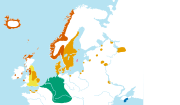referred to as elision. The word epenthesis comes from epi- 'in addition to' and en- 'in' and thesis 'putting'. Epenthesis may be divided into two types:...
30 KB (3,288 words) - 08:23, 20 September 2024
Old Norse (section Epenthesis)
Old Norse, also referred to as Old Nordic, or Old Scandinavian, was a stage of development of North Germanic dialects before their final divergence into...
112 KB (8,843 words) - 03:10, 21 September 2024
Vowel hiatus (section Epenthesis)
extra consonant sound. A consonant sound may be added between vowels (epenthesis) to prevent hiatus. That is most often a semivowel or a glottal, but all...
7 KB (803 words) - 15:02, 21 August 2024
from Russian. Vowel epenthesis from Russian to Nenets крупа (krupa) > xurupa "cereals" класс (klass) > xalas "class" Vowel epenthesis from Russian to Nganasan...
13 KB (1,346 words) - 03:09, 10 September 2024
Belter Creole (section Epenthesis and elision)
Belter Creole, also simply known as Belter (Belter Creole: lang belta), is a constructed language developed by the linguist and polyglot Nick Farmer for...
41 KB (3,897 words) - 07:48, 10 September 2024
Pijin language (section Epenthesis)
Pijin (or Solomons Pidgin) is a language spoken in Solomon Islands. It is closely related to Tok Pisin of Papua New Guinea and Bislama of Vanuatu; the...
22 KB (2,132 words) - 16:43, 16 August 2024
This article contains phonetic transcriptions in the International Phonetic Alphabet (IPA). For an introductory guide on IPA symbols, see Help:IPA. For...
34 KB (2,977 words) - 00:53, 21 September 2024
apocopated in final position after nasals: lamb, long /læm/, /lɒŋ ~ lɔːŋ/. Epenthesis (also known as anaptyxis): The introduction of a sound between two adjacent...
17 KB (2,334 words) - 14:15, 19 September 2024
described using the International Phonetic Alphabet (IPA). Elision Elocution Epenthesis Help:IPA/English — the principal key used in Wikipedia articles to transcribe...
4 KB (394 words) - 04:09, 29 September 2024
Portuguese phonology (section Epenthesis)
[ɐðɨˈβɛɾsu], but in southern Portugal there is often no epenthesis, [psikuluˈʒiɐ], [ɐdˈvɛɾsu]. Epenthesis at the end of a word does not normally occur in Portugal...
91 KB (9,367 words) - 19:50, 23 July 2024



